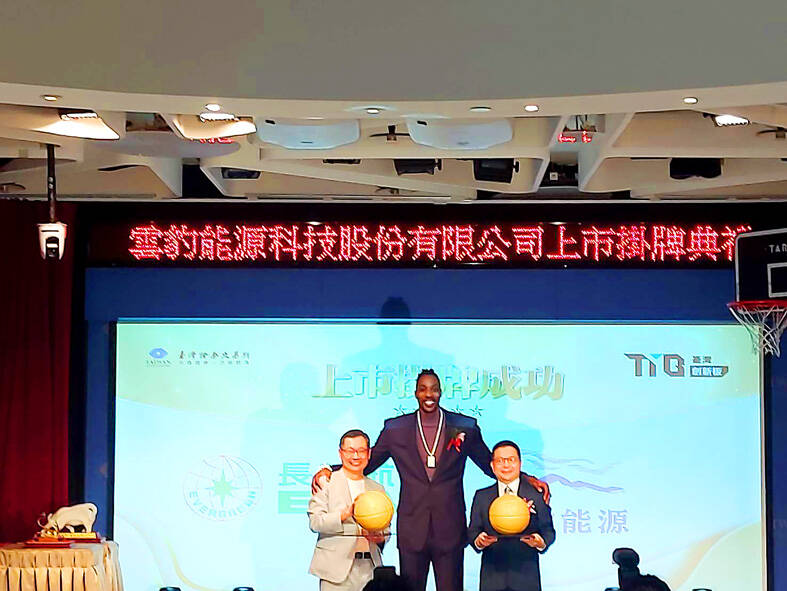Solar power developer J&V Energy Technology Co (雲豹能源) yesterday debuted its shares on the Taiwan Innovation Board (TIB), making it the second firm this year to join the start-up board of the Taiwan Stock Exchange (TWSE) after HD Renewable Energy Co Ltd (泓德能源) launched on it last week.
J&V’s shares advanced about 7 percent to NT$103 at the opening, but retreated in the session to close at NT$97 per share, just NT$1 higher than its initial public offering price of NT$96.
Launched seven years ago, J&V Energy started as a solar power developer, but has since diversified into other areas, with its energy storage business growing the fastest lately, company chairman Lai Chin-lin (賴勁麟) told a news conference in Taipei.

Photo: Chen Yung-chi, Taipei Times
The firm is building one of Taiwan’s largest fishery-and-electricity symbiosis projects, with a capacity of 128 megawatts, general manager Chao Shu-min (趙書閔) said.
The company has completed construction of 108 megawatts and would finish building the remaining 20 megawatts next month, he said.
Besides solar power, it has diversified its operations into five additional areas — offshore wind power, energy storage systems, energy trading, water treatment and biomass energy — through mergers and acquisitions, or cooperation with foreign companies and local life insurance firms, Chao said.
The company also plans to build three energy storage projects with a capacity of 100 megawatts each, at a total cost of more than NT$10 billion (US$326.6 million), it said.
However, the company faces challenges in land acquisition, intense competition, huge capital expenditures and a high debt ratio, it added.
The company’s revenue portfolio showed that infrastructure construction accounted for more than 80 percent of its revenue in 2021, while electricity sales made up the remaining 20 percent.
J&V Energy’s revenue last year rose 192 percent year-on-year to NT$6.3 billion, while net profit in the first three quarters of the year was NT$262 million, with earnings per share of NT$2.33.

Taiwan Semiconductor Manufacturing Co (TSMC, 台積電) last week recorded an increase in the number of shareholders to the highest in almost eight months, despite its share price falling 3.38 percent from the previous week, Taiwan Stock Exchange data released on Saturday showed. As of Friday, TSMC had 1.88 million shareholders, the most since the week of April 25 and an increase of 31,870 from the previous week, the data showed. The number of shareholders jumped despite a drop of NT$50 (US$1.59), or 3.38 percent, in TSMC’s share price from a week earlier to NT$1,430, as investors took profits from their earlier gains

In a high-security Shenzhen laboratory, Chinese scientists have built what Washington has spent years trying to prevent: a prototype of a machine capable of producing the cutting-edge semiconductor chips that power artificial intelligence (AI), smartphones and weapons central to Western military dominance, Reuters has learned. Completed early this year and undergoing testing, the prototype fills nearly an entire factory floor. It was built by a team of former engineers from Dutch semiconductor giant ASML who reverse-engineered the company’s extreme ultraviolet lithography (EUV) machines, according to two people with knowledge of the project. EUV machines sit at the heart of a technological Cold

AI TALENT: No financial details were released about the deal, in which top Groq executives, including its CEO, would join Nvidia to help advance the technology Nvidia Corp has agreed to a licensing deal with artificial intelligence (AI) start-up Groq, furthering its investments in companies connected to the AI boom and gaining the right to add a new type of technology to its products. The world’s largest publicly traded company has paid for the right to use Groq’s technology and is to integrate its chip design into future products. Some of the start-up’s executives are leaving to join Nvidia to help with that effort, the companies said. Groq would continue as an independent company with a new chief executive, it said on Wednesday in a post on its Web

CHINA RIVAL: The chips are positioned to compete with Nvidia’s Hopper and Blackwell products and would enable clusters connecting more than 100,000 chips Moore Threads Technology Co (摩爾線程) introduced a new generation of chips aimed at reducing artificial intelligence (AI) developers’ dependence on Nvidia Corp’s hardware, just weeks after pulling off one of the most successful Chinese initial public offerings (IPOs) in years. “These products will significantly enhance world-class computing speed and capabilities that all developers aspire to,” Moore Threads CEO Zhang Jianzhong (張建中), a former Nvidia executive, said on Saturday at a company event in Beijing. “We hope they can meet the needs of more developers in China so that you no longer need to wait for advanced foreign products.” Chinese chipmakers are in